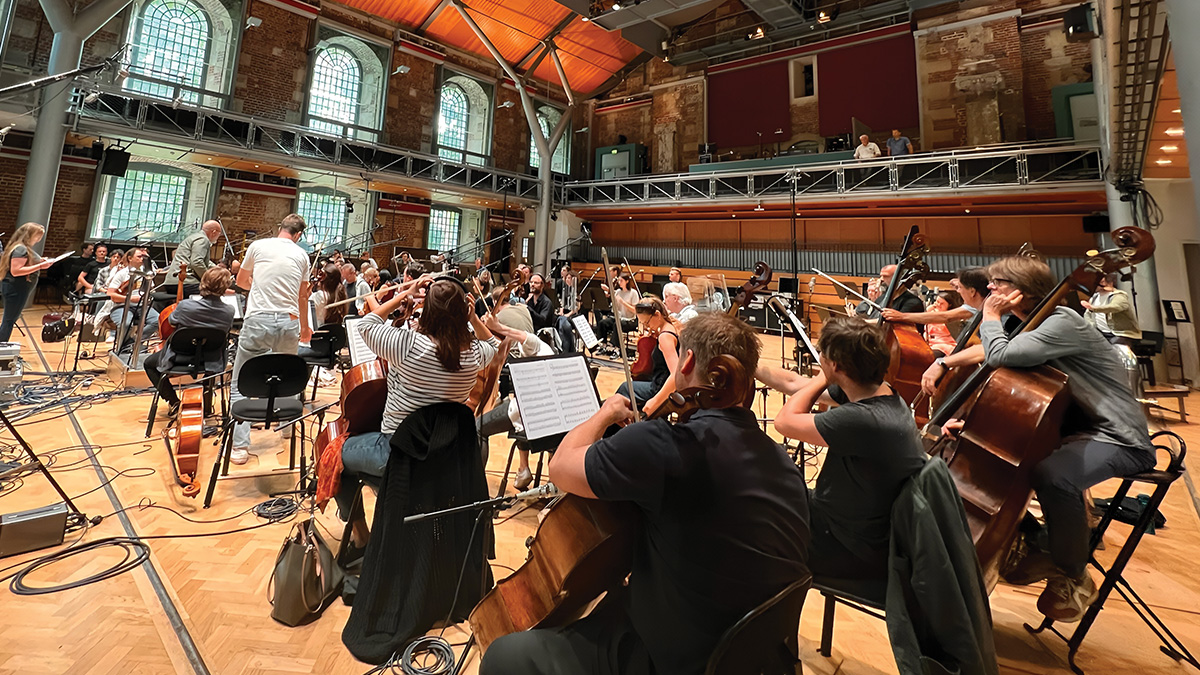Composer Lorne Balfe delves into the process of scoring life itself in Netflix’s Life on Our Planet.
Evolution has a sound.
Its theme is a universal harmonic, but the passing tones are dissonant.

The musical veteran found new ground withLife on Our Planet.
Ive never done anything in this genre, Balfe tells us.
I always tried different things.
Life on Our Planetis not set in paradise, although some landscapes fleetingly pass for Eden on the surface.
It begins in a pristine but lethal environment.
This ancient bacteria is the greatest single character in the history of the planet.
Its reach is epic, and the conclusion is as dramatic as all stories ever told.
It makes for an intriguing project.
You choose something because it interests you, whets the appetite, Balfe says.
What I liked was doing things in the past and present.
That was very unique to me.
Also, getting to help tell a story to something that has the voice of God.
Im the newbie, Balfe says.
The audience is expecting a certain thing.
The creatives from [production company] Silverback have a vast knowledge of storytelling in this genre.
As soon as we started talking, I started seeing it.
The soundtrack has to capture nature thematically and strives to be timeless.
Its about understanding the next generation thats going to be watching this and learning from it, Balfe says.
If theres a theme you automatically can grab onto, that will always help the storytelling.
Sound and vision have always been interconnected in Balfes artistic process.
I never wrote music that wasnt to-picture, he says.
I always needed some bigger force to instruct while creating.
The directors ofLife on Our Planetsuggested the universal source material.
Its strange, Balfe says.
There wasnt any direction of composition, no discussing music in great detail.
We discussed the emotion and how the audience is going to relate to it.
TheNetflixseries asks viewers to expand their worldview, and the music helps bridge fantastical realities to familiar territory.
Balfes accompaniment breathes life intothe filmmakers vision.
I wanted to have the concept of life and breath, Balfe says.
Thats why we ended up recording Anna Lapworth, whos an amazing organist, at the Royal Albert Hall.
Its a very classical instrument thats got life to it.
The air thats pumped through it…
I tried to create a school that what you hear is what you see.
There was a clear bible of musical themes, Balfe says.
Holding it all together are the central themes of survival, predators, prey, and sustenance.
We started this by creating the food groups, Balfe says.
Youve got to have a clear building block.
You know what the story is.
Youll be going into the world of mammals; you know youre covering world extinction.
It was important to create suites and themes that will cover the whole series, Balfe says.
So its getting into an emotional state to understand how to write about it.
But Balfe took no long walks in the forest or trips to locations barely known to man.
I live in a basement, he explains.
I dont have clocks or daylight.
Theres a reason most composers have bad complexions.
To prepare forLife on Our Planet, the first thing the musician did was get to the roots.
I did research about the oldest instruments, Balfe says.
I was looking at the bone flutes found in the caves.
That was the sonic experiment.
Nine times out of 10, it will be a song.
The composer learned brevity early in his career.
I did jingles for a long time.
It was a harder job because you have 30 seconds to sell a product.
Ive never seen any difference between jingles and film scoring.
When youre composing, you have to think in the style of the instrument.
Balfe needed modern Homo sapiens to identify with their place in the ongoing story ofLife on Our Planet.
I wanted a connection, and the voice is very important.
Before any instrument, the voice was the first thing we were able to create music with.
The score forLife on Our Planetis written for a mere 65-piece orchestra.
Balfe says dynamics have nothing to do with how many players are in the band.
Numbers dont count; its the intention, Balfe says.
WithMission: Impossible, it was the locations.
I wanted to connect the musicians to the actual geographical point of view.
With this show, there was a concept of singular musicians who brought very unique instrumentation.
The players needed more than musical chops at auditions; they had to fit their parts.
I treat the musicians the same as a casting agent, Balfe says.
You choose who you feel connected to.
Two of the top orchestras in the world contributed to this series.
And it was very special, being able to have all the directors come to the recording sessions.
This is because every death is a stepping stone to a more advanced way of surviving.
Balfe has the same attitude toward his adaptations.
The only reason that you stop experimenting is time, Balfe says.
When that clock stops, then youve run out of time.
But its really about evolving.
You think differently when youre working with great musicians; you experiment, they bring something to the table.
They improvise, so its constantly evolving.
There is a technical thing about sample rate, Balfe says and grins.
You just have to keep evolving and changing it.
The perfect key is harmony.
Life on Our Planetis streaming now on Netflix.